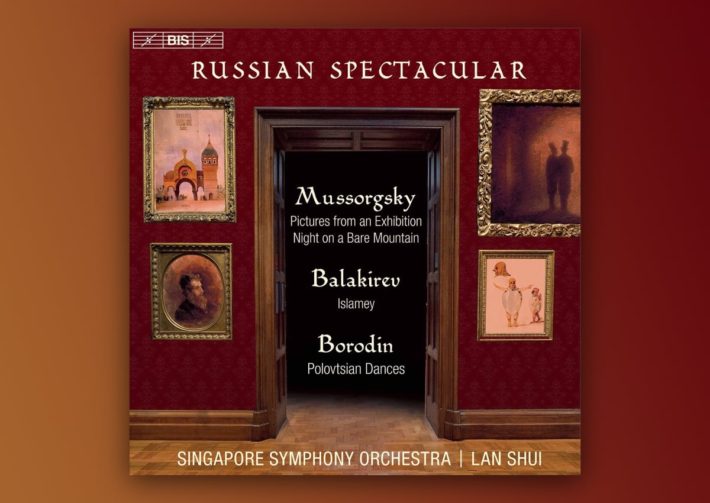Looking just at the program, the Singapore orchestra’s latest album feels somewhat anachronistic. When I was growing up it seemed like this repertoire was regularly recorded by the world’s greatest orchestras. Many of those ‘classic’ recordings are reissued, again and again, but a new recording, especially one in super-audio sound, is welcome. While the choice of orchestra may surprise some, anyone who has heard these forces in their recently completed Rachmaninov symphony cycle knows this is an ensemble that knows how to play Russian repertoire. Indeed, the enthusiastic and brilliance of the performances, heard in a particularly exceptional BIS SACD recording, make this album an easy recommendation.
The album opens with an exciting rendition of Rimsky-Korsakov’s (RK) version of Mussorgsky’s “Night on Bare Mountain.” This is a slight disappointment for those of us who prefer Mussorgsky’s far more radically original version. Thankfully, there are several thrilling recordings of that version; the one played by the National Orchestra of the Ukraine and Theodore Kuchar includes both Mussorgsky’s original and RK’s sanitized version. Comparing the two makes for fascinating listening.
Kuchar’s performance of the RK version has a more menacing opening – the orchestral sound is weightier, with a more authentic Slavic accent. The same is true of Solti’s 1966 classic recording, in which the London Symphony plays as if possessed. Yet in the later half of the work, as the music softens, Shui and his players come into their own, playing with a finesse that simply outclasses their Ukrainian colleagues. And BIS’s engineering ensures we hear every subtle coloristic gradation.
Shui’s interpretation of Mussorgsky’s “Pictures” is refined and thoroughly musical. The opening Promenade, taken at a spacious tempo, is phrased in more legato style. There are a few moments where one might crave a more extroverted and brazen approach. The lower strings and basses could have more heft in “Gnomus,” the brass are too reigned in at the climax of “Il vecchio castello,” and “Baba-Yagá” needs a more emphatic attack and greater weight to the sound in its opening measures. But there is ample compensation in the often-ravishing timbres Shui conjures from his players. The Singapore winds are characterful, the saxophone playing particularly sultry. The orchestra’s softer playing has a wonderful delicacy (“Tuileries”) and the unhatched chicks (track 9) could not be more playful. “The Great Gate of Kiev” is resplendent, though there is a slightly jarring tempo change at 3’09”. The tam-tam packs a tremendous wallop, and the final chords have an overwhelming impact.
Related Classical Music Reviews
- Review: Mussorgsky – Pictures at an Exhibition, Ravel – La Valse – Les Siècles, Roth
- Review: “Silver Age” – Daniil Trifonov Plays Stravinsky, Prokofiev, Scriabin
- Review: Behzod Abduraimov Plays Debussy, Chopin Mussorgsky
Gergiev’s reading with the Vienna Philharmonic is undeniably wilder. Gergiev somehow gets the Viennese players to forego their usual refulgent beauty for a robust, at times aggressive earthiness. But Decca’s recording, bright and overly harsh, cannot match BIS’s stupendous sonics, and Gergiev’s interpretation often seems two-dimensional when compared to Shui’s reading.
Balakirev’s “Islamey,” written for piano but later orchestrated by Lyapunov, is perhaps the least recorded work on the program. Shui and his players revel in the score’s many shifting colors and find a playfulness in the writing that eludes Gergiev and his Mariinsky Orchestra.
The concluding work, Borodin’s “Polovtsian Dances,” has done well on disc. Beecham’s recording is a classic, as is Solti’s recording with the London Symphony. Mackerras’ recording with the Royal Liverpool orchestra and chorus is similarly impressive. But Shui and his forces are even finer, in a performance of infectious energy that carefully builds to the final section’s dazzling climax. The engineered sound is again a key ingredient to the success of the performance: the choir is perfectly balanced with the orchestra, allowing us to hear every word, sung with clear diction and robust tone. Each climax has room to grow and expand without ever feeling constrained.
Program notes are detailed and engaging. There are a wide variety of interpretative viewpoints for this repertoire, but far fewer are as musical as these performances, and BIS’s recording is stupendous – warmly recommended.

“Russian Spectacular”
Mussorgsky – Night on the Bare Mountain, Pictures from an Exhibition (orch. Ravel)
Balakirev – Islamey (orch. Lyapunov)
Borodin – Polovtsian Dances from Prince Igor (orch. Rimsky-Korsakov and Liadov)
Singapore Symphony Chorus
Singapore Symphony Youth Choir
Singapore Symphony Orchestra
Lan Shui – Conductor
BIS Records, Hybrid SACD BIS2412
Recommended Comparisons
Read more classical music reviews or visit The Classic Review Amazon store











